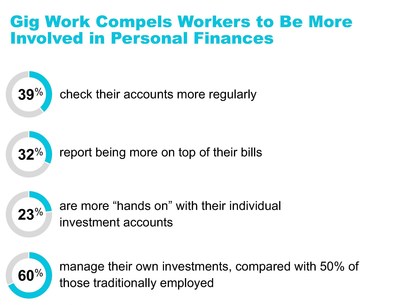T. Rowe Price: Gig Economy Workers Pay More Attention To Their Money

Additionally, gig workers are more likely to be proactive with their finances than traditional workers,
Additional findings of the survey include:
- Gig and traditional workers report similar levels of income. Twenty-eight percent of both gig and traditional workers cite an annual income of
$75,000 or higher. - The gig economy may be closing the employment gap for men and women. Based on survey responses, men led women in traditional full- or part-time employment, with a 12-point difference, whereas the gap was smaller with a five-point difference between men and women working in the gig economy.
- Both gig and traditional workers consider their work satisfying. Eighty percent of gig workers are more likely to plan to continue working in some capacity after reaching retirement age, compared to 61 percent of traditional workers, with the majority of both gig and traditional workers stating they plan to continue to work because of personal satisfaction, versus a need to do so.
"Individuals participating in the gig economy are generally perceived as less financially stable, but it's really encouraging to see that they are building similar levels of income as traditional workers," said
THE GIG ECONOMY & GENERATIONAL VIEWS
- Motivation for participating in the gig economy changes with age. Older respondents participating in the gig economy were more likely to be motivated by work/life balance and less about money, with baby boomers twice as likely to participate for this reason compared to other generations.
- Generation X shows the highest rate of gig economy work participation. Thirty-two percent of Generation X respondents work independently in some capacity, compared to 18 percent of millennials and 26 percent of baby boomers.
- Millennials are less likely to view traditional work as secure. Twenty-six percent of millennials feel the gig economy offers more job security than traditional work, higher than both Generation X (18 percent) and baby boomers (15 percent).
- Among survey respondents, baby boomers expressed the most positive feelings about the gig economy. Baby boomers associated words such as "free," "independent," and "empowered" when describing how the gig economy makes them feel, more often than Generation X and millennials. However, a higher percentage of baby boomers are more likely to enter the gig economy out of necessity—43 percent—versus 23 percent of millennials and 33 percent of Generation X respondents.
ABOUT THE SURVEY
ABOUT
Founded in 1937,
![]() View original content with multimedia:http://www.prnewswire.com/news-releases/t-rowe-price-gig-economy-workers-pay-more-attention-to-their-money-300622673.html
View original content with multimedia:http://www.prnewswire.com/news-releases/t-rowe-price-gig-economy-workers-pay-more-attention-to-their-money-300622673.html
SOURCE
T. Rowe Price, public relations: Monique Bosco, 410-345-5740, Monique_Bosco@troweprice.com; Nadine Youssef, 410-577-5098, Nadine_Youssef@troweprice.com

